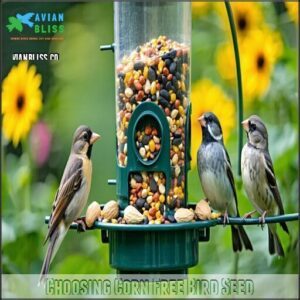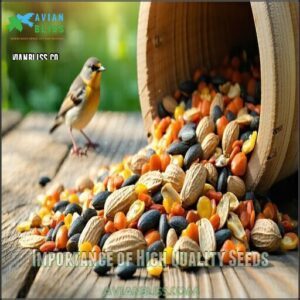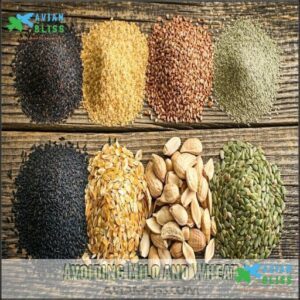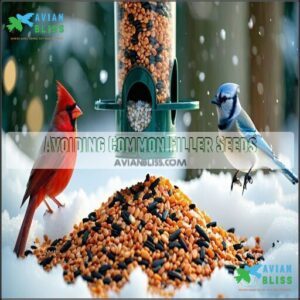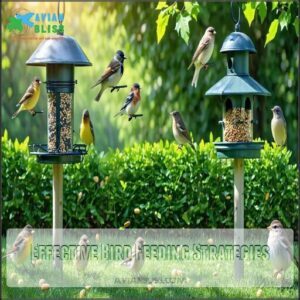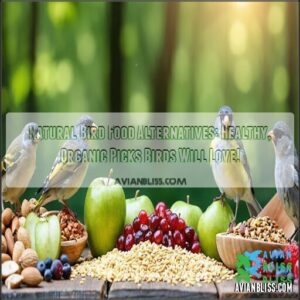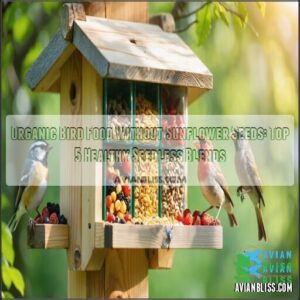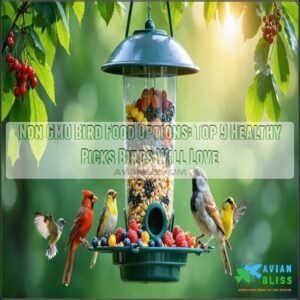This site is supported by our readers. We may earn a commission, at no cost to you, if you purchase through links.
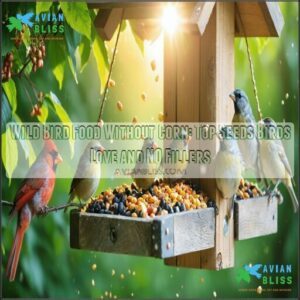
Black oil sunflower seeds attract colorful songbirds like cardinals and chickadees while safflower seeds bring finches and titmice to your yard.
Nyjer seeds work well for smaller birds.
Quality seed mixes without corn reduce waste and discourage unwanted visitors like squirrels and raccoons.
They also minimize germination under feeders.
Look for mixes containing sunflower seeds, safflower, nyjer, and peanut pieces.
The right seed selection turns your backyard into a vibrant bird sanctuary where the real action happens between birds and seeds.
Table Of Contents
- Key Takeaways
- Choosing Corn Free Bird Seed
- Wild Bird Food Ingredients Matter
- Creating Custom Bird Seed Blends
- Effective Bird Feeding Strategies
- Frequently Asked Questions (FAQs)
- Can birds eat wild delight seeds & nuts?
- What can birds eat?
- What is a suitable bird food mix?
- Can birds eat no-mess bird seed?
- What is 5 lb. Zero Waste bird food?
- Can birds eat canary grass seed?
- What bird seed has no corn in it?
- Should wild birds eat corn?
- What is the cheapest way to feed wild birds?
- What can I use to bind bird seed together?
- Conclusion
Key Takeaways
- You’ll attract more colorful songbirds with corn-free bird food featuring black oil sunflower seeds, safflower, nyjer, and peanut pieces.
- Corn-free mixes reduce waste under feeders, discourage squirrels, and keep your feeding area cleaner.
- High-quality seed blends without fillers like wheat and milo provide better nutrition and fewer leftovers.
- Creating custom blends with sunflower seeds, safflower, and peanuts ensures variety and supports bird health year-round.
Choosing Corn Free Bird Seed
When choosing bird seed without corn, focus on blends with high-quality ingredients like black oil sunflower seeds and peanuts.
These options provide better nutrition and attract a wider variety of birds to your feeders.
Benefits of No Corn Bird Food
Switching to corn-free bird food offers several benefits for your backyard.
You’ll see less waste under feeders and enjoy more birds visiting your station. Songbirds prefer no corn bird seed mixes, leading to variety and cleaner feeders.
Plus, corn-free blends naturally deter squirrels while boosting nutritional density. Choosing the right organic bird food is essential for well-being.
- Waste Reduction: Birds eat more, leaving less mess.
- Songbird Variety: Attract colorful species.
- Cleaner Feeders: Less leftover debris.
- Squirrel Deterrent: Fewer unwanted visitors.
Attracting Cardinals Without Corn
Cardinals thrive on corn-free bird food like black oil sunflower seeds, safflower seeds, and millet.
Cardinals flourish with corn-free options—black oil sunflower, safflower, and millet fulfill their nutritional needs perfectly.
They love dense shrubs, such as dogwood and sumac, for shelter and berries.
Add a water source, like a shallow bird bath, to attract colorful visitors. You can find more sunflower seeds cardinals online.
Providing safe spaces and natural cover guarantees these vibrant birds feel welcomed while adding beauty to your backyard sanctuary.
Black Oil Sunflower Seeds Alternative
Black oil sunflower seeds are a game-changer for cornfree bird food.
Lightweight shells make them ideal for songbirds, while high oil content boosts energy. Add them to cornfree blends for vibrant feeders.
Here’s how sunflower seeds shine:
- Black Oil Sunflower Seeds: High in energy, they attract colorful species.
- Sunflower Hearts: No shells, no mess—perfect for clean feeding.
- Safflower Seed or Nyjer Seed: Pair well for variation birds love.
- Peanut Pieces or In-Shell Peanuts: Packed with protein, ideal for colder months.
- Hulled Sunflower Seeds: Enhance feeding without creating debris.
These seeds energize and attract.
Wild Bird Food Ingredients Matter
Choosing the right ingredients in bird food guarantees you’re giving birds the nutrients they need.
High-quality seeds like black oil sunflower and safflower are better than fillers like milo and wheat, which many birds avoid, providing a clear example of how to use high-quality seeds.
Importance of High Quality Seeds
When choosing cornfree bird food, what you feed birds isn’t just feed—it’s energy.
Highquality wild bird food with nutrient-dense ingredients directly supports bird health.
Seeds packed with protein and fat give birds the stamina they need, especially in harsh weather.
Skip fillers that birds ignore, like corn, and focus on premium options.
The energy source matters, and birds thrive on clean, fresh, non-GMO seed.
Look for bird food ingredients birds love, like sunflower or peanut seeds.
You’ll attract more birds while wasting less.
Avoiding Milo and Wheat
Milo and wheat might seem harmless in wild bird food, but they’re often ignored or wasted.
These fillers don’t deliver the nutrition that birds need and can even harm feed areas.
Instead, opt for grain-free blends with better alternatives. Try these options:
- Millet for finches and doves.
- Nyjer seeds for finches and siskins.
- Safflower seeds, preferred by cardinals.
- Sunflower hearts, rich in energy.
- Peanut pieces for a protein boost.
Avoiding milo and wheat guarantees a cleaner, healthier feeding environment.
Benefits of Black Oil Sunflower Seeds
A go-to favorite for bird enthusiasts, black oil sunflower seeds deliver unmatched benefits for wild birds.
Black oil sunflower seeds aren’t just bird food—they’re the ultimate avian energy source that transforms your backyard into a vibrant hub.
With exceptional oil content and thin shells, they’re easy for even small-billed birds to enjoy. Their nutritional value supports energy and body heat during harsh winters while attracting birds year-round.
Adding sunflower chips or kernels enhances a no waste feeding experience, keeping areas clean. Squirrels are also drawn to these seeds, so consider squirrel-proofing strategies for your feeders.
- Packed with high-energy oils that sustain birds in cold weather
- Ideal seed size makes them versatile for various species
- Attracting birds like cardinals, chickadees, and sparrows
- A top choice for any wild bird seed mix
Creating Custom Bird Seed Blends
You can create custom bird seed blends to suit the specific needs of your local birds.
Focus on using quality seeds like sunflower seeds, peanuts, safflower, and nyjer to provide ideal nutrition without fillers.
Mixing Sunflower Seeds and Peanuts
Creating a wild bird food mix with sunflower seeds and peanuts is simple and effective.
Sunflower seeds provide a much-needed energy boost, while peanuts pack protein for bird health.
Use a 3:1 seed ratio for better bird attraction and to deter squirrels.
This blend is cost-effective and attracts species like cardinals, chickadees, and woodpeckers.
See a variety of sunflower seeds peanuts available online.
Keep your mix fresh by storing it in airtight containers.
| Ingredient | Nutrient Benefit | Purpose |
|---|---|---|
| Sunflower Seeds | Energy Boost | Main Attractor |
| Peanuts | Protein | Nutritional Support |
| Airtight Storage | Freshness | Longer Shelf Life |
| 3:1 Ratio | Balanced Mix | Ideal Bird Attract |
| No Fillers | Quality Assurance | Squirrel Deterrent |
Adding Safflower Seeds and Nyjer Seeds
Your bird food blend reaches new heights with safflower seed and nyjer seeds.
These make feeding finches and cardinals easy while discouraging squirrels and unwelcome birds.
- Safflower Benefits: A favorite for cardinals and a natural squirrel deterrent.
- Nyjer Attraction: Perfect for finch favorites like goldfinches.
- Seed Combinations: Adjust seasonally to meet bird needs.
- Squirrel Deterrent: Deters squirrels while attracting delightful wild bird species.
Consider that AutoShip offers convenience for consistent supply.
Place nyjer seeds in tube feeders for safe, efficient feeding.
Avoiding Common Filler Seeds
Now that you’ve incorporated safflower and nyjer seeds into your mix, let’s focus on what to avoid.
Many commercial bird food blends contain inedible fillers that waste your money and create messy feeding areas.
Most birdseed fillers end up scattered below feeders while songbirds search for higher-quality options, increasing seed waste and reducing cost savings.
Effective Bird Feeding Strategies
You can maximize bird visits by offering a variety of seeds and using no-mess blends to keep feeding areas clean.
Supporting local habitats with native plants provides birds with natural shelter and food sources.
Using No Mess Bird Seed Blends
Now that you know how to mix your own blends, let’s look at no-mess options for easier feeding.
No-mess bird food saves you time and keeps your yard clean. These cornfree seed mixes contain only edible parts.
Consider purchasing premixes for convenience.
- Feeder compatibility matters – choose hull-free seeds for tube feeders
- Waste reduction is significant – no shells means no cleanup under feeders
- Cost comparison favors no-mess seed long-term despite higher initial price
- Squirrel deterrence improves with shell-free options they find less appealing
Offering Variety of Seeds and Ingredients
Diversifying your bird seed offerings creates a wildlife restaurant that caters to various species.
Smart ingredient combinations help you attract specifics while providing nutritional diversity.
| Seed Type | Birds Attracted | Nutritional Value | Seed Textures | Best Season |
|---|---|---|---|---|
| Black Oil Sunflower | Cardinals, Chickadees | High fat, protein | Hard shell | Year-round |
| Nyjer | Finches, Siskins | Omega-3 rich | Tiny, needle-like | Winter-Spring |
| Safflower | Cardinals, Grosbeaks | Medium protein | White, hard | Year-round |
| Sunflower Hearts | Woodpeckers, Nuthatches | High energy | Soft, no shell | Cold months |
| Peanut Pieces | Jays, Titmice | High protein | Crunchy chunks | Fall-Winter |
Seasonal variety guarantees your wild birds receive complete nutrition throughout the year, while different seed blends address varying dietary needs across species, ensuring a year-round attraction and providing high energy to the birds.
Planting Native Plants for Birds
Beyond quality seeds, your backyard can become a bird haven through native plants.
Native vegetation complements your feeding stations by providing natural food sources and shelter.
Try these proven approaches:
- Select native trees like oaks and dogwoods that support caterpillars and produce fruits
- Add berry-producing shrubs such as serviceberry and spicebush for seasonal feeding
- Plant nectar-rich flowers like cardinal flower for hummingbirds
- Include native grasses that provide seeds and nesting materials
A shallow water source near your plantings creates a complete habitat.
To further enhance the habitat, consider reducing pesticide use.
Local plant species require less maintenance while attracting more wild birds.
Your yard becomes a natural sanctuary supporting birds’ entire life cycle, making it a wildlife-friendly area with native plants and a place for seasonal feeding.
Avoiding Cracked Corn and Wheat Mixes
Why continue using cracked corn and wheat mixes when they create unnecessary waste?
Birds typically discard these filler seeds while searching for nutritionally superior options like black oil sunflower seeds. By switching to cornfree bird food with quality ingredients, you’ll attract more colorful songbirds and also discourage hungry squirrels.
A proper cost-benefit analysis reveals that premium blends without fillers actually save money long-term – birds consume everything rather than scattering unwanted husks.
Your feeders stay cleaner, bird health improves without empty calories from wheat’s impact, and you’ll enjoy more activity at your feeding stations with less cleanup required.
Frequently Asked Questions (FAQs)
Can birds eat wild delight seeds & nuts?
Yes, wild bird food is often made up of seeds and nuts that birds can enjoy.
Just make sure to choose varieties without corn for a cleaner mix that attracts more colorful songbirds.
What can birds eat?
Birds can eat seeds, nuts, fruits, insects, and nectar. Your feathered friends thrive on black oil sunflower seeds, nyjer, safflower, peanuts, and fruit. They’ll avoid corn-based mixes with fillers.
What is a suitable bird food mix?
Nearly 65% of backyard birds prefer seed mixes with sunflower seeds. You’ll want a mix containing black oil sunflower, safflower, and nyjer seeds to attract colorful songbirds like cardinals and chickadees.
Can birds eat no-mess bird seed?
No-mess bird seed works perfectly for your feathered visitors.
You’ll find they readily eat these hull-free, 100% edible mixes containing sunflower kernels, nuts, and other nutritious ingredients without creating scattered shells below.
What is 5 lb. Zero Waste bird food?
The 5 lb. Zero Waste bird food features 100% edible ingredients without shells or hulls.
You’ll find sunflower kernels, shelled peanuts, and tree nuts that birds will eat completely, leaving no mess behind.
Can birds eat canary grass seed?
Canary grass seed is perfectly safe for wild birds.
You’ll find many species enjoy it, including finches and sparrows.
It’s nutritious and makes a great addition to your bird feed mix.
What bird seed has no corn in it?
Like a peaceful garden without weeds, corn-free bird seed options include Corn-Free Supreme Blend, No Waste Blend, and mixes featuring black oil sunflower seeds, safflower seeds, nyjer seeds, and peanut pieces.
Should wild birds eat corn?
Corn isn’t ideal for wild birds.
It’s low in nutrients and often contains fillers.
You’ll attract more colorful songbirds with high-quality alternatives like black oil sunflower seeds, safflower, and nyjer seed.
What is the cheapest way to feed wild birds?
While piggy banks protect savings, your best bird-feeding option is black oil sunflower seeds. They’re cost-effective, nutrition-dense, and attract many species. You can also make DIY feeders from recycled containers.
What can I use to bind bird seed together?
You can bind bird seed together using gelatin, corn syrup, honey, or melted suet.
Mix your chosen binder with seeds, press into molds, and refrigerate until firm for homemade bird seed cakes.
Conclusion
Like a well-orchestrated symphony, the right wild bird food without corn transforms your yard into nature’s stage.
By choosing quality seeds—black oil sunflower, safflower, nyjer, and peanut pieces—you’ll attract colorful songbirds while deterring unwanted visitors.
Your feeders will become hotspots of activity without the mess of germinating corn.
Remember, investing in premium wild bird food without corn isn’t just feeding birds; it’s creating a thriving ecosystem right outside your window, which is a key part of maintaining a healthy environment and supporting nature’s stage.
- https://prf.hn/l/XvARxxm
- https://www.marthastewart.com/8117757/how-attract-cardinals-backyard
- https://www.birdsandblooms.com/birding/attracting-birds/six-ways-attract-cardinals/?srsltid=AfmBOorHEywnRnN7amjT4CinpqpWG87bIjUuFS3apaqDY7MD6LF9_Xd_
- https://www.perkypet.com/articles/how-to-attract-cardinals?srsltid=AfmBOooFz9dbsmwkLFi_IS-BbUR1jf93s6btXlQMOfcmmIeGZyHxd0ro
- https://thebackyardnaturalist.com/wordpress/resources/best-quality-seed-wild-birds/

